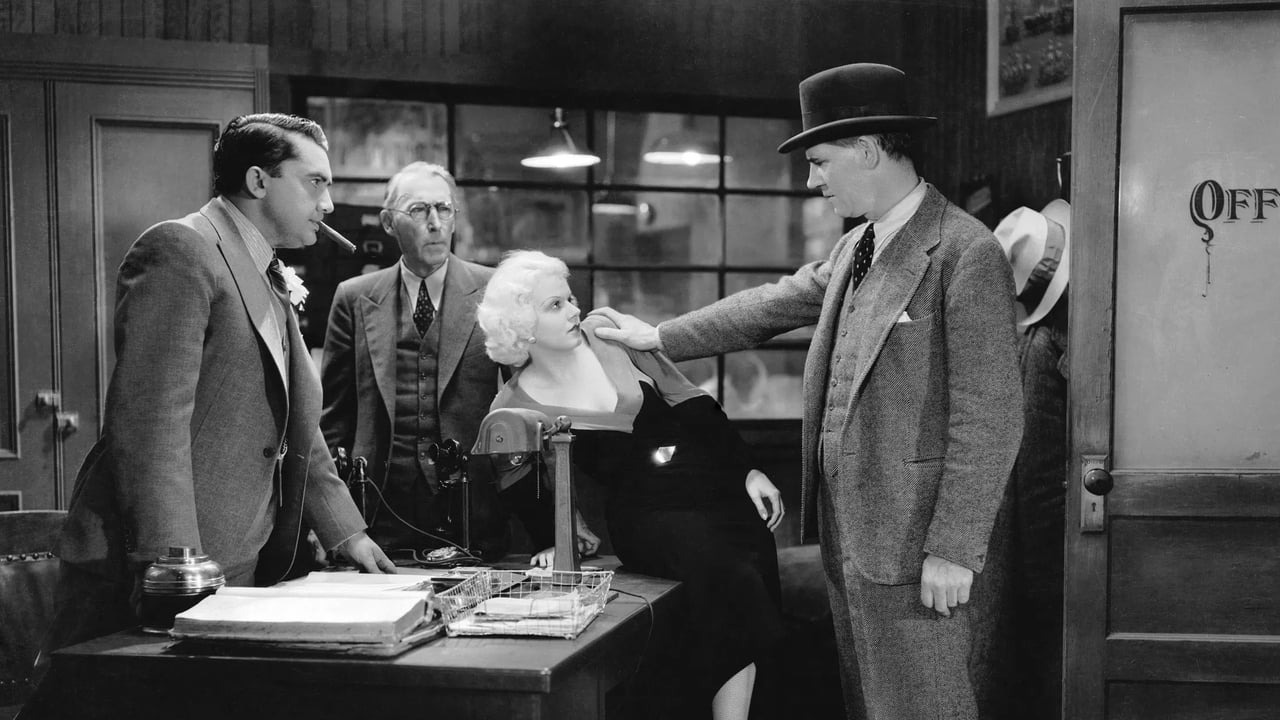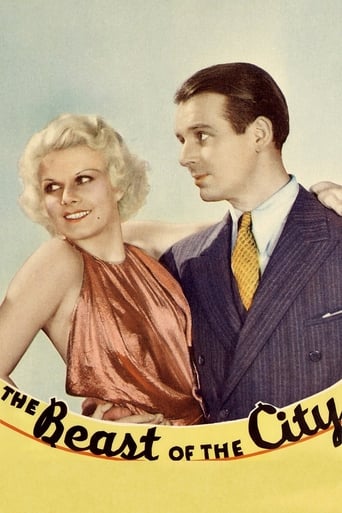Karry
Best movie of this year hands down!
Solidrariol
Am I Missing Something?
Sanjeev Waters
A movie that not only functions as a solid scarefest but a razor-sharp satire.
mukava991
Unlike most gangster films of the early 30s, this Hearst-produced item was fiercely on the side of the law (with a supporting quote by President Herbert Hoover directly following the opening credits), as personified by Walter Huston, as a charming "everyman" Irish cop with a weak-willed younger brother (Wallace Ford). Huston is a charming family man (extended scenes with his wife and children underscore this point, to distraction) who dedicates himself to wiping out crime in a generic, unnamed American city during Prohibition when bootleggers were the scourge of the nation. Ford, lured by gang moll Jean Harlow, gets mixed up with a crime syndicate (led by German-accented Jean Hersholt uncharacteristically cast as a loathsome Italian gangster). Harlow gets the best lines and is easily the most engaging element of the story. The resolution is earnest if technically clumsy and obvious, but with Harlow, Huston, Hersholt and Tully Marshall, who delivers a rousing courtroom monologue (not to mention a supporting role played by an 11-year-old Mickey Rooney), it's worth a look.
dougdoepke
The prologue says it all—people need to support the cops, not the gangsters. After all, it's 1932, the depths of the depression, and cops are seen by much of the public as enforcers of a broken system. Desperadoes like Dillinger, Baby-Face Nelson, and Bonnie & Clyde are romanticized as ordinary folks driven to robbing hated banks. At the same time, romanticizing films such as Public Enemy (1931) and Little Caesar (1931) are smash hits at the box-office. Tellingly, cops are depicted here as opposing a crime boss's (Belmonte) attempt to take over the city, not busting up strikes, enforcing repossessions, or chasing down dashing desperadoes.It's a pretty good crime movie up to the ridiculous climax, where the two sides look like warring armies engaged in a frontier showdown. Why a police chief would deploy his men so recklessly is a real stretch. But, never mind, since there's a metaphorical point at stake here —namely, that police will honorably and bravely defend families no matter the personal cost to them, much as seen in popular Western movies. As a result, what makes for a positive social message is seen in the shootout as not necessarily translating into persuasive cinema.Harlow makes for a convincing trollop—note her pre-Code liking for pain when properly done! Also, Walter Huston remains one of the fine forgotten actors from this period. Here, he again shows a real ability to convey strong emotion in an understated way. The movie also benefits from LA street locations. It's always a kick to see the styles and fashions from that long ago time. Anyway, taken in its time period, the movie remains very revealing in more ways than one.
Glenn Andreiev
MGM tried to go for the hard edged style of Warner Brothers gangster films with this drama about a strict DA (Walter Huston making an amazing turn as a tough guy) looking to clean up the city. The film is stolen by Jean Harlow, as a loose woman luring Huston's rookie cop brother (Wallace Ford) down the highway to sin. Her `koochie-dance' she performs for Ford is quite the eyeful! And dig that vicious, mind bending ending!
Jason-38
This is one of the grittiest of the pre-Production Code features. It is important to realize that just two years later, with the implementation of the rewritten Production Code in 1934, this film could not have been made.As with any piece of popular entertainment that is nearly 70 years old, there are going to be dated elements. What is more important is how relatively modern this film feels, especially compared to the films made under the Production Code after 1934. The story is a hard slice of life, and it will not suit all tastes. This is especially true for those who have been too conditioned by Production Code features and television.The ending has been compared to Sam Peckinpah's THE WILD BUNCH and Don Siegel's DIRTY HARRY, and not without cause. However, try to imagine yourself as a member of the original theatrical release audience in 1932. There would have been very little to prepare you for it, apart from DOORWAY TO HELL, LITTLE CAESAR, PUBLIC ENEMY, and SCARFACE. The difference here is that the story is told from the point of view of the men in law enforcement. It focuses on something that was common knowledge at the time, that prohibition had corrupted law enforcement far beyond the scope of anything the public had ever known.The remedy for corruption that this film prescribes is very strong medicine indeed. You may not like it, but I defy you not to think about it for a long time after you've seen it.

